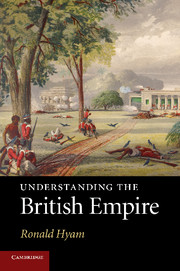Book contents
- Frontmatter
- Contents
- List of plates
- List of figures
- List of maps
- List of tables
- Preface
- Acknowledgements
- List of abbreviations
- Introduction: perspectives, policies, and people
- I Dynamics: geopolitics and economics
- II Ethics and religion
- III Bureaucracy and policy-making
- IV Great men
- V Sexuality
- VI Imperial historians
- 17 Imperial and Commonwealth history at Cambridge, 1881–1981: founding fathers and pioneer research students
- 18 The Oxford and Cambridge imperial history professoriate, 1919–1981: Robinson and Gallagher and their predecessors
- Published writings of RH on imperial history
- Index
18 - The Oxford and Cambridge imperial history professoriate, 1919–1981: Robinson and Gallagher and their predecessors
Published online by Cambridge University Press: 05 August 2012
- Frontmatter
- Contents
- List of plates
- List of figures
- List of maps
- List of tables
- Preface
- Acknowledgements
- List of abbreviations
- Introduction: perspectives, policies, and people
- I Dynamics: geopolitics and economics
- II Ethics and religion
- III Bureaucracy and policy-making
- IV Great men
- V Sexuality
- VI Imperial historians
- 17 Imperial and Commonwealth history at Cambridge, 1881–1981: founding fathers and pioneer research students
- 18 The Oxford and Cambridge imperial history professoriate, 1919–1981: Robinson and Gallagher and their predecessors
- Published writings of RH on imperial history
- Index
Summary
[Newly written for this volume, this chapter incorporates material on Professor Mansergh which first appeared in the Oxford dictionary of national biography, vol. XXXVI (2004), and on professors Robinson and Gallagher in a review of the second edition of Africa and the Victorians (1981), in the Journal of Imperial and Commonwealth History, vol. 11 (1983), and in ‘South Africa, Cambridge, and Commonwealth history’, Round Table: the Commonwealth Journal of International Affairs, vol. 90, no. 360 (2001).
The aim here is to contribute towards a better understanding of these historians, and what they may or may not have achieved, rather than to assess their work critically or answer their critics.]
The elite group of Oxford and Cambridge professors of imperial history forms a natural unit for historiographical study. Oxford was the pioneer in the field, both with infrastructure (libraries and scholarships) as well as appointments. In 1905 the mining magnate Alfred Beit, shortly before he died, founded the Oxford professorship and a lectureship in colonial history. It was another generation before Cambridge had its first (partly) imperial chair. Thereafter there was considerable interpenetration between the two universities. Of the Oxford professors, Gallagher, Robinson, and Judith Brown came from Cambridge, while Oxford supplied Walker, Mansergh, Fieldhouse, Low, and Bayly to Cambridge. Only Gallagher held chairs in both universities. Although one could not claim that all the leading British historians of empire in the twentieth century were professors at either Oxford or Cambridge, many of them were.
- Type
- Chapter
- Information
- Understanding the British Empire , pp. 509 - 537Publisher: Cambridge University PressPrint publication year: 2010

